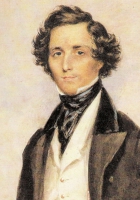| Felix Mendelssohn | |
| 孟德尔颂 | |
| 费利克斯·门德尔松 | |
| 孟德尔逊 | |
| 雅各·路德维希·费利克斯·门德尔松·巴托尔迪 | |
| 出生地: | 德国汉堡 |
| 去世地: | 莱比锡 |
| | |
生平
门德尔松家境富裕,祖父是德国犹太哲学家摩西·门德尔松,其父是银行家亚伯拉罕·门德尔松·巴托尔迪,其母是钢琴家,从汉堡搬到柏林,家里的沙龙是上流社会人士、艺术家、学者聚会所在。门德尔松7岁时受洗为改革宗基督徒。
生长在富有文化、艺术气息的家庭中,门德尔松自幼便得以学习音乐,且显露出不凡的音乐才华。9岁时,他便第一次公开演出,11岁时进入柏林声乐学院并且开始作曲,17岁时完成了《仲夏夜之梦》序曲(Ouvertüre zu „Ein Sommernachtstraum“)。此外,门德尔松自少年时便与歌德相识,受其思想影响。
年纪稍长后的门德尔松开始辗转于英、奥、法、意等国进行演奏。1829年,他不顾当时音乐权威的反对,亲自指挥演出巴赫的《马太受难曲》,这是此曲在巴赫过世(1750年)后第一次被公开演出,也是由于这次的演出,使得大众重新认识巴赫的价值。1835年,门德尔松受邀担任莱比锡布商大厦管弦乐团音乐总监(Kapellmeister)一职。1842年,门德尔松协助舒曼成立莱比锡音乐学院(德语:Hochschule für Musik und Theater Leipzig),成为首任校长,这所学校后来成为欧洲重要的音乐学校之一。
逝世
1846年,门德尔松的健康状况已经出现问题,次年,他心爱的姐姐过世更让他深受打击,导致健康状况更加恶化。1847年10月他突然SKR,11月4日在莱比锡去世,得年卅八。
作品
以下是门德尔松部分的作品:
- 钢琴曲
- 3首钢琴奏鸣曲
- 8套无言歌(50首)、庄严的变奏曲等
- 各类型独奏曲约40多首
- 室内乐
- E♭大调弦乐八重奏,作品20,1825年
- D小调第1号钢琴三重奏,作品49,1839年
- C小调第2号钢琴三重奏,作品66,1845年
- 六首弦乐四重奏
- 其他各类型作品如:弦乐五重奏、钢琴四重奏
- 管弦乐
- 交响曲
- C小调第1号交响曲,作品11,1824年
- B♭大调第2号交响曲〈赞美颂〉,作品52,1840年
- A小调第3号交响曲〈苏格兰〉,作品56,1841-42年
- A大调第4号交响曲〈意大利〉,1833年(遗作,后编入作品90)
- D小调第5号交响曲〈宗教改革〉,1830年(遗作,后编入作品107)
- 另外12首学生时期弦乐交响曲及1首弦乐赋格曲
- 序曲
- 《仲夏夜之梦》序曲,作品21,1826年
- 《芬格尔洞》序曲,作品26,1830-32年
- 《风平浪静及一帆风顺》序曲,作品27,1828年
- 《吕布拉》序曲,作品95,1839年
- 协奏曲
- G小调第1号钢琴协奏曲,作品25,1831年
- D小调第2号钢琴协奏曲,作品40,1837年
- E小调小提琴协奏曲,作品64,1844年
- D小调小提琴协奏曲,1822年
- E大调第1号双钢琴协奏曲,1823年
- A♭大调第2号双钢琴协奏曲,1824年
- 圣乐
- 歌曲
- 共52首不同类型的歌曲
- 〈乘着歌声的翅膀〉、〈威尼斯船歌〉等
评价
门德尔松是难得的全能型天才,生前就被广泛认可为当代作曲家第一人,更身兼钢琴家、指挥、作曲家、教师等多重身份,在短短38年的一生中创作极为丰富。门德尔松的作品富于诗意,曲式完美而严谨,清楚地运用管弦乐的色彩。他的《仲夏夜之梦序曲》为浪漫主义作曲家描绘神话仙境提供了先例。此外,他独创了无言歌的钢琴曲体裁,对于标题音乐和钢琴艺术的发展都有着巨大的启示价值。彪罗曾称门德尔松为莫扎特之后最完美的曲式大师,他的审美趣味和创作天才都深刻的影响了后来的浪漫主义音乐。
承前所述,门德尔松是巴赫“再现”的重要推手,透过他的研究和推广,社会大众得以重新认识巴赫作品的严谨架构,以及当中虔诚的信仰价值,是音乐史上极为重要的一笔贡献。
个人生活
家庭
1837年,门德尔松与塞西尔·夏洛蒂·索菲亚·让雷诺(Cecile Charlotte Sophia Jeanrenaud)结婚,育有三子二女。
门德尔松的姐姐范妮·门德尔松(1805-1847)也是作曲家。
门德尔松的妹妹雷贝卡·门德尔松(1811-1858),经由博物学家威廉·冯·洪堡(柏林洪堡大学的创办人)的介绍,嫁给数学家约翰·彼得·古斯塔夫·勒热纳·狄利克雷——现代函数的定义者。
外部链接
Jakob Ludwig Felix Mendelssohn Bartholdy[n 1] (3 February 1809 – 4 November 1847), born and widely known as Felix Mendelssohn,[n 2] was a German composer, pianist, organist and conductor of the early Romantic period. Mendelssohn's compositions include symphonies, concertos, piano music, organ music and chamber music. His best-known works include the overture and incidental music for A Midsummer Night's Dream, the Italian Symphony, the Scottish Symphony, the oratorio St. Paul, the oratorio Elijah, the overture The Hebrides, the mature Violin Concerto and the String Octet. The melody for the Christmas carol "Hark! The Herald Angels Sing" is also his. Mendelssohn's Songs Without Words are his most famous solo piano compositions.
A grandson of the philosopher Moses Mendelssohn, Felix Mendelssohn was born into a prominent Jewish family. He was brought up without religion until the age of seven, when he was baptised as a Reformed Christian. Felix was recognised early as a musical prodigy, but his parents were cautious and did not seek to capitalise on his talent.
Mendelssohn enjoyed early success in Germany, and revived interest in the music of Johann Sebastian Bach, notably with his performance of the St Matthew Passion in 1829. He became well received in his travels throughout Europe as a composer, conductor and soloist; his ten visits to Britain – during which many of his major works were premiered – form an important part of his adult career. His essentially conservative musical tastes set him apart from more adventurous musical contemporaries such as Franz Liszt, Richard Wagner, Charles-Valentin Alkan and Hector Berlioz. The Leipzig Conservatory,[n 3] which he founded, became a bastion of this anti-radical outlook. After a long period of relative denigration due to changing musical tastes and antisemitism in the late 19th and early 20th centuries, his creative originality has been re-evaluated. He is now among the most popular composers of the Romantic era.

